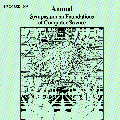We consider the expander routing problem formulated by Ghaffari, Kuhn, and Su (PODC 2017), where the goal is to route all the tokens to their destinations given that each vertex is the source and the destination of at most $\deg(v)$ tokens. They developed $\textit{randomized algorithms}$ that solve this problem in $\text{poly}(\phi^{-1}) \cdot 2^{O(\sqrt{\log n \log \log n})}$ rounds in the $\textsf{CONGEST}$ model, where $\phi$ is the conductance of the graph. Later, Ghaffari and Li (DISC 2018) gave an improved algorithm. However, both algorithms are randomized, which means that all the resulting applications are also randomized. Recently, Chang and Saranurak (FOCS 2020) gave a deterministic algorithm that solves an expander routing instance in $2^{O(\log^{2/3} n \cdot \log^{1/3} \log n)}$ rounds. The deterministic algorithm is less efficient and does not allow preprocessing/query tradeoffs, which precludes the de-randomization of algorithms that require this feature, such as the $k$-clique enumeration algorithm in general graphs. The main contribution of our work is a new deterministic expander routing algorithm that not only matches the randomized bound of [GKS 2017] but also allows preprocessing/query tradeoffs. Our algorithm solves a single instance of routing query in $2^{{O}(\sqrt{\log n \cdot \log \log n})}$ rounds. Our algorithm achieves the following preprocessing and query tradeoffs: For $0 < \epsilon < 1$, we can answer every routing query in $\log^{O(1/\epsilon)} n$ rounds at the cost of a $(n^{O(\epsilon)} + \log^{O(1/\epsilon)} n)$-round preprocessing procedure. Combining this with the approach of Censor-Hillel, Leitersdorf, and Vulakh (PODC 2022), we obtain a near-optimal $\tilde{O}(n^{1-2/k})$-round deterministic algorithm for $k$-clique enumeration in general graphs, improving the previous state-of-the-art $n^{1-2/k+o(1)}$.
翻译:暂无翻译




